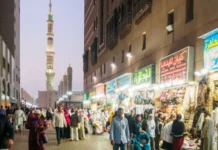However, the awareness of sustainability is growing exponentially and eco-tourism in the UAE is also rapidly expanding. Now travelers seek destinations where they can do as much nature as possible without damaging the environment. However, a natural dynamic also surrounds the UAE, from deserts and mountains to coastal habitats. So, in a manner, this guide takes you through some of the top eco tourism opportunities in the UAE and its neighbouring regions. First, I’m going to discuss best eco friendly locations, activities, government reforms, sustainable travel tips of responsible tourism.
WHAT IS ECO-TOURISM?
Eco-tourism is a responsible travel approach that focuses on:
- Preserving natural environments
- Minimizing carbon footprints
- Supporting local communities
- Conservation efforts awareness unlike big tourist promo than eco friendly tourism in the UAE, eco friendly travel is only promoting awareness Unlike conventional tourism, eco friendly travel in the UAE only involves nature conservation, low impact activities, and sustainable hospitality services.
Read This Article: Sustainable Travel Tips for Uae Residents: Eco-Friendly Ways to Explore the Emirates
ECO-TOURISM DESTINATIONS IN THE UAE
Al Wathba Wetland Reserve (Abu Dhabi)
There are over 250 bird species living in this nature reserve, including flamingos. The UAE government has gone ahead to conserve the wetlands to support biodiversity.
Activities:
✔ Birdwatching
✔ Eco-friendly walking trails
✔ Wildlife photography
Ras Al Khor Wildlife Sanctuary (Dubai)
This sanctuary is situated in Dubai where it is an important ecological site that has a refuge for migratory birds including thousands of flamingos.
Activities:
✔ Guided eco-tours
✔ Educational workshops on conservation
✔ Nature photography
Hatta (Dubai)
Sustainable tourism activities such as eco friendly camping and mountain biking in natural landscape are available in Hatta which is an adventure friendly destination.
Activities:
✔ Kayaking at Hatta Dam
✔ Hiking and eco-lodges
✔ Organic farm visits
Sir Bani Yas Island (Abu Dhabi)
This island is a conservation success, with the endangered species roaming free at the Arabian Wildlife Park.
Activities:
✔ Safari tours with sustainable practices
✔ Eco-lodges with renewable energy
✔ Marine conservation experiences
Jebel Jais (Ras Al Khaimah)
Jebel Jais is the highest peak in the UAE and offers eco-tourism as well as hiking, stargazing and sustainable adventure sport.
Activities:
✔ Zip-lining with minimal environmental impact
✔ Sustainable trekking and camping
✔ Birdwatching
ECO-TOURISM OPPORTUNITIES NEAR THE UAE
Musandam, Oman
Musandam is famous for its pristine fjords and marine biodiversity at a short drive from Dubai. With that, it’s an ideal spot for responsible marine tourism.
Activities:
✔ Dolphin watching with ethical tour operators
✔ Eco-friendly snorkeling and diving
✔ Traditional dhow cruises with local guides
Salalah, Oman
Assuming Salalah, lush green landscapes and waterfalls, is close to the UAE, then the eco friendly travelifies and therefore takes Salalah as an attractive destination.
Activities:
✔ Visiting Frankincense Forests (UNESCO Heritage Site)
✔ Exploring Wadi Darbat’s natural waterfalls
✔ Sustainable desert safaris
Socotra Island, Yemen
During the Buntings assesment, Socotra is often referred to as the “Galápagos of the Middle east.
Activities:
✔ Trekking in alien-like landscapes
✔ Beachside eco-camping
✔ Observing endemic plant species
ECO-FRIENDLY ACCOMMODATIONS IN THE UAE
Sustainable hotels in the UAE are eco friendly stays for those travelers who wish to minimize their carbon footprint. Some top options include:
Al Maha, a Luxury Collection Desert Resort (Dubai)
- Built using sustainable materials
- Solar-powered water heating
- Supports desert wildlife conservation
Anantara Sir Bani Yas Island Resorts (Abu Dhabi)
- Uses renewable energy sources
- Works closely with the Arabian Wildlife Park
- Implements water recycling systems
Six Senses Zighy Bay (Oman, near the UAE)
- Operates using solar power
- Supports local community projects
- Offers organic and sustainable cuisine
GOVERNMENT INITIATIVES PROMOTING ECO-TOURISM IN THE UAE
They [Trekking ] have introduced several initiatives to promote sustainable travel in the UAE such as:
✔ Tourism is one of the aiming areas of the UAE Green Growth Strategy.
✔ Sheikh Zayed Protected Areas Network: Helps in the conservation of UAE’s biodiversity.
✔ Sustainable Tourism Strategy 2030: Adopts eco-friendly practices by hotels and tour operators. The UAE also encourages renewable energy projects such as Masdar City that help to reduce their carbon footprint.
BEST TIME TO EXPLORE ECO-TOURISM IN THE UAE
From October to April, the weather is agreeable for outdoor activities and is considered the best season for eco-touring in the UAE. In summer months (June – August) do not avoid, as there is really hot.
Best seasonal activities:
- Winter (Dec-Feb): Camping, wildlife watching, and hiking
- Spring (Mar-Apr): Desert safaris and mountain treks
- Autumn (Oct-Nov): Birdwatching and kayaking

HOW TO BE A RESPONSIBLE ECO-TOURIST?
To travel sustainably, follow these eco-friendly tourism tips:
✔ Find and stay at accommodations with Eco Certifications.
✔ Use Public Transport or Carpool: Reduces carbon footprint.
Respect Wildlife and Nature: Do not touch or create any disturbance to animals.
✔ Bring your reusable water bottle AND your eco-friendly bag!
Buy Local Businesses
✔ and Avoid mass produced souvenirs.
WHY CHOOSE ECO-TOURISM IN THE UAE?
✔ Diverse natural landscapes (deserts, marine reserves, etc.)
✔ Government-backed conservation efforts
✔ Growing demand for sustainable travel experiences
✔ Adding value to an experience of UAE outside its cities. This enables travelers to have unique eco tourism adventures in the UAE while contributing to the environmental sustainability.
THE ROLE OF ECO-TOURISM IN PRESERVING THE UAE’S NATURAL HERITAGE
However, the role of eco-tourism in conservation of UAE’s unique natural landscapes (desert, wetlands and marine ecosystem) is essential. Thus, by advocating for the sustainable tourism practices, the government and other private sector contributes in the protection of endangered species, biodiversity and environment impact. Eco tourism is successful for conserving the mixed response areas such as Ras Al Khor wildlife sanctuary and Al wathba wetland reserve. Preservation of natural heritage plus educational opportunities for tourists to become educated about environmental sustainability are not the only ways through which these initiatives contribute to the protection of the environment.
HOW ECO-TOURISM CONTRIBUTES TO THE UAE’S SUSTAINABLE DEVELOPMENT GOALS
The United Arab Emirates has linked its eco-tourism sector to United Nations on SDGs that emphasizes environmental protection, economic growth and responsible consumption especially. The UAE Green Growth strategy and Sustainable Tourism Strategy 2030 are commitments to cutting carbon footprints while moving to a much greener way to attract tourists. The UAE has been leading in this area by investing in renewable energy projects, eco resorts and conservation programs in order to be an example for sustainable tourism in the region. This focus on the community, on renewable (or ‘alternative’) energy, and conservation makes sure that tourism development doesn’t come at the expense of environmental degradation.
CHALLENGES AND FUTURE PROSPECTS OF ECO-TOURISM IN THE UAE
The UAE has progressed in the development of an eco-tourism but there are still challenges in the making. There are some outdoor activities that are only possible in the cooler months of the year due to the harsh climate, but rapid urbanization threatens natural ecosystems. Conservation efforts happening alongside the tourism growth also requires tight regulations and monitoring. Although there is hope in the future of eco tourism in UAE, new sustainable tourism projects are being introduced such as expansion of the eco resorts, nature reserves, and renewable energy powered attactions. Such investments in green infrastructure and stricter conservation policies will further increase the country’s eco-tourism potential.

IMPACT OF RESPONSIBLE TOURISM ON LOCAL WILDLIFE AND COMMUNITIES
By engaging in eco tourism of UAE, there is a positive impact on wildlife conservation and local communities. Projects such as that of conservation on Sir Bani Yas Island and Jebel Jais help protect endangered species, while it helps community based tourism empowerment for the locals. It makes sure that local businesses, artisans and local guides benefit from the rise of the industries. Responsible dolphin watching tours in Musandam or desert conservation safaris in Dubai combine with ethical tourism such as responsible wildlife tourism, that helps educate visitors of the importance of protecting natural habitats in order to promote economic growth in the surrounding areas.
CONCLUSION
The UAE is more than a modern hub for architecture and luxury, it’s also a start to eco-tourism opportunities. Nature can be explored in their countless ways including in the heart of the mountains of Ras Al Khaimah and around the wetlands of Abu Dhabi. For the travellers aiming to explore out of UAE, towards close by objectives like Musandam, Salalah and Socotra Island are immaculate ecological tourism encounters that urge for responsible travel. By opting for ecofriendly travel, we get to enjoy a meaningful connection with nature without spoiling and harming these natural wonders of nature for the future generations. Therefore, when planning a trip the next time, it could be a good time to go to an eco friendly location in UAE and visit at the same time!









